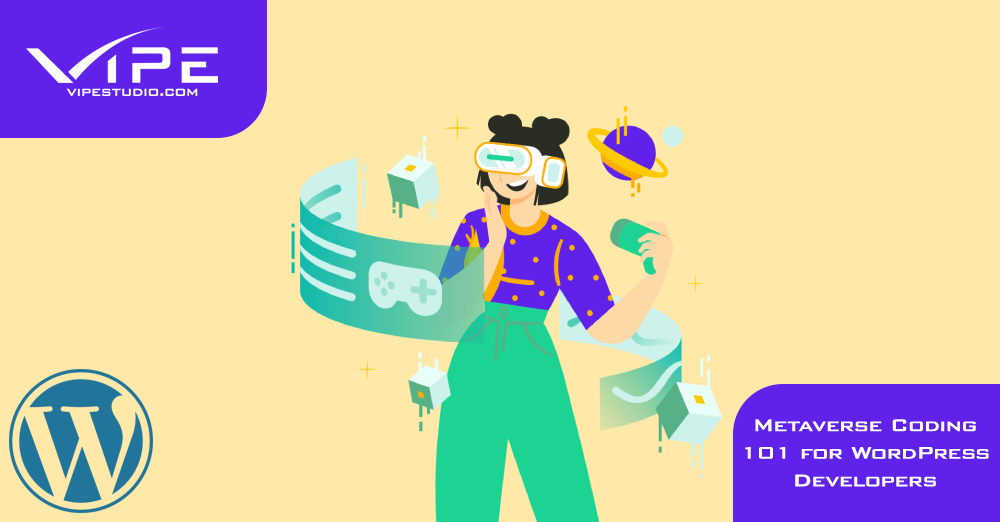17.08.2022
WordPress Development
Metaverse Coding 101 for WordPress Developers
READING TIME: MIN
Table of Content
“The Metaverse is not magic, it is a new world created by aliens from planet Earth to give an infinite experience of the existing world.”
― Anuj Jasani
Our WordPress agency for enterprise absolutely loves this quote by Anuj Jasani. Ever since Mark Zuckerberg announced the rebranding of Facebook as Meta, the ‘Metaverse’ has become one of the most discussed topics within the tech industry.
The concept promises to turn science fiction stuff into reality, thus bridging the gap between the virtual realm and our actual physical environment. And what means will be used to achieve that grandiose aspiration? All kinds of innovative technologies (some of which are yet to be conceived), helmed by Augmented Reality (AR) and Virtual Reality (VR).
Anuj Jasani says the Metaverse is a brand-new world created by aliens from planet Earth. So who can be those peculiar aliens that are already working toward the inception of a world that’s beyond our wildest imaginations? The answer is pretty obvious – programmers.
Yes, the same people who create and maintain websites and mobile applications are the ones who can realise the Metaverse concept. Of course, WordPress developers are among those cool aliens too.
Our enterprise WordPress agency believes the demand for Metaverse engineers and developers will only grow from now on (especially if the Metaverse ever takes off and becomes as mainstream as, say, social media). After all, the Metaverse is already receiving funding from businesses and investors from all around the globe who are actively financing development teams, products, and experiences.
All of this opens doors for skilled programmers who wish to play a part in the construction of the Metaverse. If you are a Metaverse-enthusiast yourself, you might be wondering: what programming languages do I have to know in order to start coding for Metaverse experiences? Well, you’ve certainly come to the right place as our WordPress agency for enterprise holds the key to the answer to this question.
This blog post is perfect for anyone who wants to create their own Metaverse or who is a professional or aspiring software developer interested in building virtual worlds or associated services and products. We will start by exploring the Metaverse concept and the way it operates after which we’ll discuss the programming languages you need to know to code Metaverse-related experiences (this includes augmented reality (AR), virtual reality (VR), blockchain/cryptocurrency, etc). Let’s go!

So What Exactly Is the Metaverse?
The Metaverse, to put it simply, is a network of immersive 3D virtual worlds that emphasise social connection through virtual and augmented reality technology.
Our enterprise WordPress agency was curious to find out that according to Verified Market Research, the size of the Metaverse Market would increase from its 2020 value of USD 27.21 billion to USD 824.53 billion by 2030. This means that we can expect to see a CAGR of 39.1% from 2022 to 2030.
It’s important to note that the Metaverse isn’t really a distinct platform, it’s more of a concept. It entails the idea of a virtual online world, or a collection of virtual online spaces, that can be accessed via virtual reality (VR) or augmented reality (AR). So there won’t be a single Metaverse, but rather a collection of Metaverse experiences. The Metaverse is also characterised by blockchain and cryptocurrency technology (used to facilitate transactional processes).
The Metaverse will be all about real-time and persistent experiences, which differentiates it from many spaces we are familiar with from current video games. This implies that activities will take place in real-time, and the space will remain active even if you exit it.
Our WordPress agency for enterprise reminds you that the Metaverse was previously only present in a few virtual worlds like “Second Life” and “Entropia Universe”, but is now widely known owing to Mark Zuckerberg and the recent rebranding of Facebook as Meta.
The Metaverse concept is growing more significant as so many aspects of our lives seem to be moving online. Of course, this whole process was greatly facilitated by the pandemic, which forced people to move their communication almost entirely online through video conferencing and virtual meetings.
Additionally, the Metaverse’s arrival is also sped up by the accessibility of VR headsets, which were once an expensive luxury item but are now becoming more widely available.
Our enterprise WordPress agency wants to point out that (at least for now) the Metaverse concept is highly dependent on things like VR headsets and so affordability will play a big part in the possible adoption of various Metaverse experiences and products.
After all, if you want to make the Metaverse mainstream, you’ll have to provide an affordable means to access it and engage with it. We’ll have to stay around a bit longer to see whether that will be possible or not, but according to various research, the future of the Metaverse seems pretty bright and promising.
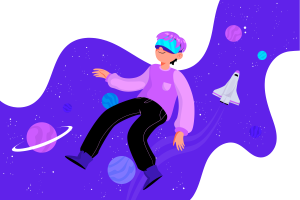
The Metaverse Has Layers. 7 of Them.
Remember when Shrek said: “Onions have layers. Ogres have layers. You get it? We both have layers.”? How is this relevant to the Metaverse, you may ask? Well, similarly to onions, the Metaverse has layers too. Get it? They both have layers. Allow our WordPress agency for enterprise to explain further.
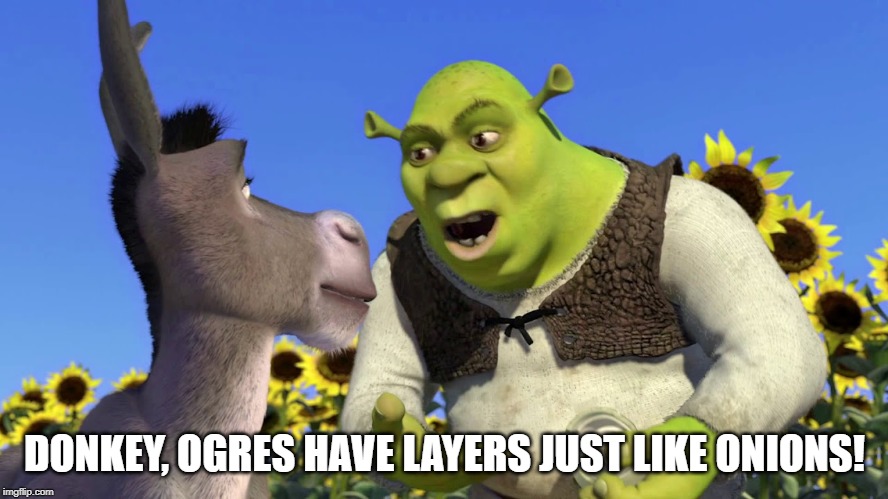
So the Metaverse has 7 layers. And no, Shrek wasn’t the one who came up with this concept. It was actually Jon Radoff – a popular author and entrepreneur – who outlined the seven core layers of the Metaverse. These seven layers serve to depict the various stages of the Metaverse market’s value chain.
Our enterprise WordPress agency likes this methodical technique that aims to define the Metaverse’s structure since it helps to gain a better understanding of the concept (which, let’s face it, can sometimes be rather confusing).
With that being said, let’s check out the 7 layers of the Metaverse, as described by Jon Radoff. We believe that understanding the Metaverse is the key to properly coding things for it. Here are the 7 layers of the Metaverse:
- Experience: Games | Social | eSports | Theatre | Shopping
- Discovery: Ad Networks | Social Curation | Ratings | Stores | Agents
- Creator Economy: Design Tools | Asset Markets | Workflow | Commerce
- Spatial Computing: 3D Engines | VR/AR/XR | Multitasking UI | Geospatial Mapping
- Decentralisation: Edge Computing | AI Agents | Microservices | Blockchain
- Human Interface: Mobile | Smartglasses | Wearables | Haptic | Gestures | Voice | Neural
- Infrastructure: 5G | WiFi 6 | 6G | Cloud | 7nm to 1.4nm | MEMS | GPUs | Materials
Our WordPress agency for enterprise reminds you that this isn’t the first seven-layer model to present a crucial framework. For instance, the seven layers of the OSI Model have long been used in the IT industry to organise networking functions into a set of universal guidelines and specifications that support interoperability across various hardware and software.
It’s possible that the seven-layer model proposed by Radoff will become a similar conceptual framework for the Metaverse. But again, we’ll have to wait and see as no one really knows what the future holds (especially when we’re talking about the ever-evolving world of technology).
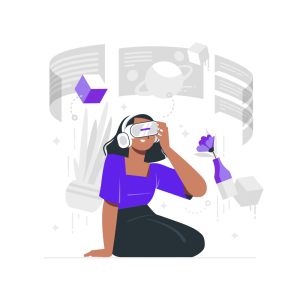
Before You Start Writing Code, Understand the Metaverse Experience
Before you start programming for the Metaverse, our enterprise WordPress agency believes you first need to understand the specific experiences you’ll be activating through your code.
Check out the bullet points below to better grasp the idea behind Metaverse experiences:
- Persistency: The Metaverse never resets, pauses, or ends, it just keeps on going regardless of whether you are engaging with it at the moment or not.
- Real-Time: The Metaverse will be a living experience in which everyone may participate in real-time.
- Functional Economy: The Metaverse will encourage individuals and businesses to develop, own, invest in, and sell anything that has “worth” that is acknowledged by others.
- Unlimited number of concurrent users: Our WordPress agency for enterprise reminds you that the Metaverse will allow for an unlimited number of concurrent users. This means that everybody can be a member of the Metaverse and take part in a specific event/place/activity at the same time.
- Bridge between the digital and physical worlds: The Metaverse should offer a seamless experience that spans both the virtual and real worlds, private and public networks, and open and closed platforms.
- Interoperability: The Metaverse experiences will provide a never before seen interoperability across data, digital assets, content, and more.
- Contribution: The Metaverse will be packed with “content” and “experiences” that have been produced, run, and consumed by a very diverse group of contributors (our enterprise WordPress agency reminds you that these can be individuals, businesses, informally organised groups, etc.).
WordPress Developers, Get To Know the Popular Technologies Associated With the Metaverse
As the Metaverse concept grows in popularity, more and more companies and platforms compete for the title “Number 1 Metaverse Platform”.
However, there are two popular development tools (or platforms) that seem to be trusted by plenty of developers who are testing the waters of the Metaverse. The platforms we’re referring to are Unity and Unreal, both of which are 3D game development engines that are well-suited for the creation of Metaverse-specific experiences.
Our WordPress agency for enterprise has noticed that a lot of Metaverse-related job descriptions require expertise with either of these platforms.
? Unity
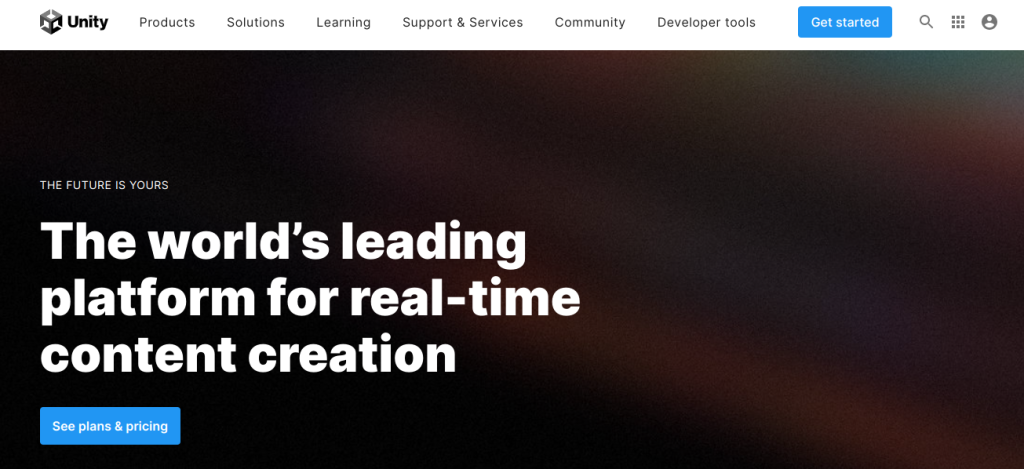
Unity is a development platform focused on VR experiences. It uses the C# language to make it simple and quick to create, develop, and release 3D games. This makes it a very good option for Metaverse developers, as both larger game development studios and smaller indie studios and hobbyists use and love it.
? Unreal
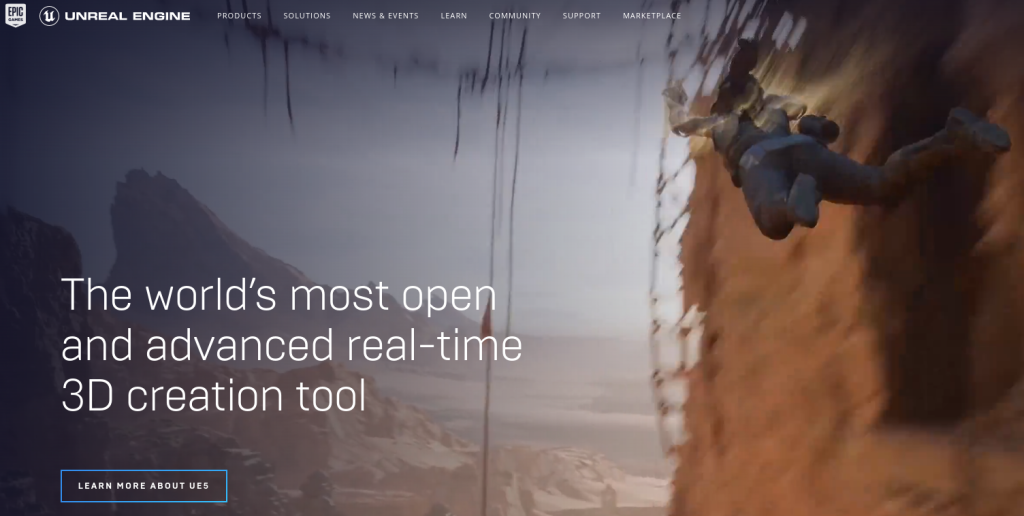
Unreal is another well-known 3D development engine. It is owned by Epic, and it uses C++ as a programming language. Our enterprise WordPress agency knows that a lot of people consider C++ to be faster and more powerful than C#, which makes Unreal an excellent option for developing reliable virtual environments and worlds.
Best Metaverse Programming Languages That Can Be Used by WordPress Developers
And now to the main point – if you are a WordPress developer looking to expand your expertise and start working on Metaverse projects, you probably know the drill – you need to become proficient in a variety of programming languages.
So read on to get familiar with the main programming languages that are already being used to build Metaverse experiences!
? C#
Our WordPress agency for enterprise is aware that, to some people, C# may seem archaic because this programming language has been around since 2000. However, this old chap is still a powerhouse that should not be neglected. In fact, C# is the foundation of many VR development platforms.
As we already mentioned, it’s the main programming language for the Unity platform, and it is also one of the most widely used languages for blockchain. This makes it a super useful language for creating a wide variety of Metaverse apps and games.
? C++
C++ is a high-level programming language used by Epic’s Unreal platform. It is also frequently used in blockchain development. This makes C++ another excellent object-oriented language that aspiring Metaverse developers can master. Not to mention that C++, much like C#, has a wide range of non-Metaverse applications, making it a valuable language for all developers.
Our enterprise WordPress agency reminds you that C++ features rudimentary memory control and advanced multithreading capabilities. All of this helps developers input data together.
And did you know that some of the most popular blockchain cryptocurrencies, including Bitcoin, Ethereum, Ripple, and Litecoin were developed using C++? Apart from that, games like the Witcher 3, Dark Souls, Elder Scrolls V: Skyrim, Player Unknown’s Battlegrounds (PUBG), Fortnite, and others were also constructed using C++.
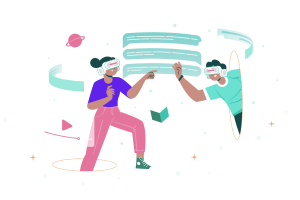
? JavaScript
Developed in 1995, JavaScript is one of the pillars of Internet programming. This object-oriented programming language is used in both Web 2.0 and Web 3.0 development, making it relevant to Metaverse projects as well. Some even refer to JavaScript as the best coding language for games.
Our WordPress agency for enterprise can assure you that despite being relatively simple to learn, this language is very complex and powerful due to the complexity of its class functions. Any coder would benefit from having this tool in their toolkit given how prevalent it is online.
Even the future of our favourite CMS – WordPress (that has been typically associated with PHP) – seems to be heading toward JavaScript (this aligns with the platform’s increased focus on the Gutenberg editor).
Particularly when compared to other programming languages, Java was created to have as minimal dependencies as feasible, making it a top language for developing games and Metaverse experiences. Games like Mission Impossible III, Minecraft, FIFA 11, Ferrari GT 3: World Track, and others were all developed using Java.
? Python
Our enterprise WordPress agency believes Python can be a valuable tool for Metaverse programmers since it’s already used a lot in VR and AR development. This is an open-source programming language with a huge user base.
Thanks to the open-source code base of the language and its large number of third-party modules, Python can be ideal if you want to create virtual reality scripts or interfaces. What’s more, learning Python will also make it easier to transition to a more complex language, like C#.
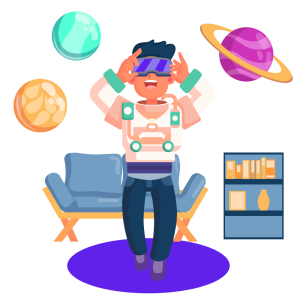
? Rust
Our WordPress agency for enterprise reminds you that blockchain is a crucial component of many Metaverse apps. This is where Rust steps in.
This is a multi-paradigm compiled programming language created by Mozilla Research. It is utilised for the development of cryptocurrencies, like the Solana blockchain, and emphasises performance and security. Rust is an open-source language with a syntax that is comparable to C++.
In a nutshell, Rust can be very beneficial to learn since it provides you with the toolset to create blockchain-specific solutions in the Metaverse. Companies funding blockchain innovation will certainly be impressed if you have Rust in your stack.
? Solidity
Another language with a strong emphasis on blockchain development is Solidity, which was created specifically for the Ethereum blockchain. Our enterprise WordPress agency believes this makes it another helpful tool for developers who wish to concentrate on the Metaverse’s blockchain component.
This is an object-oriented language that is mainly used to write and implement the so-called “Smart Contracts” in the Ethereum blockchain. Solidity offers a free support forum for anyone interested in the language and its ecosystem.

? CUDA-C
CUDA-C is another programming language you might want to consider if you’re interested in creating Metaverse experiences. This is one of the widely used languages for developing desktop games.
The CUDA-C cores help a game appear more realistic. Our WordPress agency for enterprise suggests you check out CUDA-C if you’re looking for a way to create high-resolution visuals that give off a strong 3D impression. With the help of this programming language, you can make the lighting and colours in your games way more life-like.
? Lua
Lua is among the top 10 programming languages for gaming projects, making it a good contender for the creation of Metaverse experiences as well. This is a cross-platform, lightweight scripting language that owes its increasing popularity to its simple syntax.
Major game engines that employ Lua as their primary programming language include Gideros mobile, Corona SDK, and CryEngine. And when it comes to actual games developed with Lua, some of the most notable names that our enterprise WordPress agency can tell you are Age of Conan, American Girl, Angry Birds, and Aquaria.

? Swift
Swift is another great option for those interested in game development. This is a general-purpose, multi-paradigm, compiled programming language created by Apple Inc. and the open-source community.
With this language, you can learn how to animate sprites and textures and you can also gain knowledge of physics, animations, collision effects, and how to design a game’s user interface.
? CSS3 & HTML5
CSS (Cascading Style Sheets) is a programming language used to describe how a page written in a markup language like HTML should look. Our WordPress agency for enterprise reminds you that the World Wide Web relies heavily on CSS, along with HTML and JavaScript.
With that being said, the newest generation of cascading style sheets, CSS3, grants you much more control over the appearance of your website. Since HTML5 and CSS3 work together to produce the final rendered page, getting familiar with these languages is a good idea in the context of creating Metaverse experiences.
Remember that while CSS is solely responsible for one thing – style – JavaScript is in charge of templating and dynamic components.
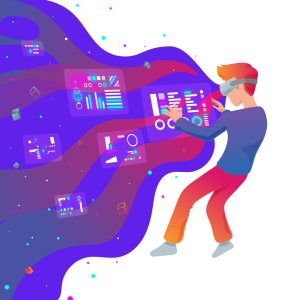
WordPress Developers, Let’s Assemble the Metaverse Together With the Help of the Right Programming Languages!
And so, it should be pretty clear by now that the development of Metaverse experiences, products, and services calls for a diverse range of skill sets.
Our enterprise WordPress agency believes that you’ll be well-prepared to enter the field of Metaverse technology if you have a solid grasp of at least a few of the top programming languages we presented in this article.
Do mind, though, that when it comes to the Metaverse, excelling at various programming languages won’t be enough. You need to equip yourself with a creative mindset too. Only then will you be able to truly contribute to this new ambitious virtual world.
Of course, we can’t say for sure that the Metaverse will actually take over and become the next big thing. We’ll have to wait and see how things progress. However, it’s pretty safe to say that the Metaverse concept has already opened a brand-new universe of possibilities for developers, creators, investors, and entrepreneurs.
? Further Reading: Do you want to learn even more about the Metaverse concept as well as the newest web development trends that are currently shaping the future of the Internet? Our WordPress agency for enterprise has you covered! Here are some expert and detailed articles about the Metaverse, Web3, and everything in between:
- How Will the New Metaverse of Mark Zuckerberg Affect WordPress and the Web Development World?
- WordPress in the Metaverse of Possibility
- WordPress in the Web3 Realm: Everything You Need to Know
- WordPress & the Internet of Things (IoT)
- The Potential of AR in WordPress Development & Design
- Enhance Your WordPress Website With Motion UI
- Headless WordPress for Omnichannel eCommerce
- REST API: The Greatest Superpower of WordPress
- API-First Approach to WordPress Development
- Blockchain Transactions in WordPress: Mission (Im)Possible?
- How to Make Your Own WordPress NFT Marketplace Website
- Cryptocurrency Plugins for WordPress (Top Picks)
More on The Topic
- Challenging Conventional Wisdom in WordPress Scalability
- Understanding Client Needs: The Art of WordPress Discovery
- Leveraging WordPress REST API: Transforming Data Handling
- Navigating WooCommerce Performance: Real-World Strategies
- The Role of AI in WordPress Development Workflows
Tags: ARaugmented realitycodinginnovationmetaversemetaverse developmentmetaverse experiencesprogrammingprogramming languagestechnologyvirtual realityvrWordPress developersWordPress Metaverse
The content of this website is copyrighted and protected by Creative Commons 4.0.


